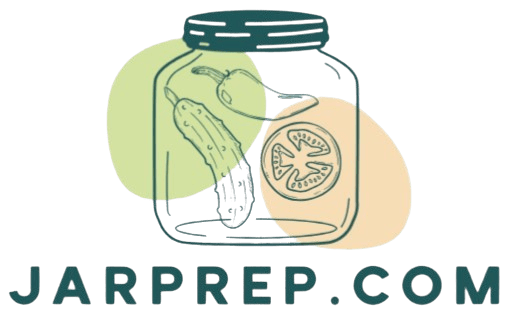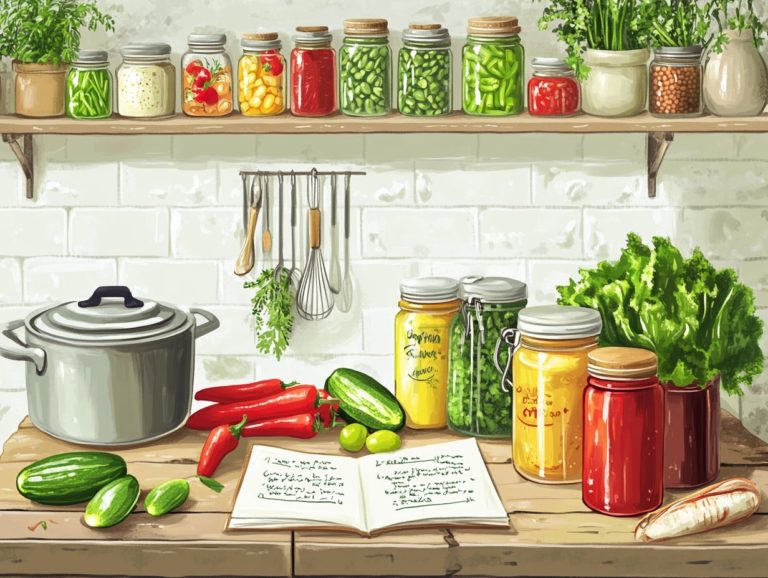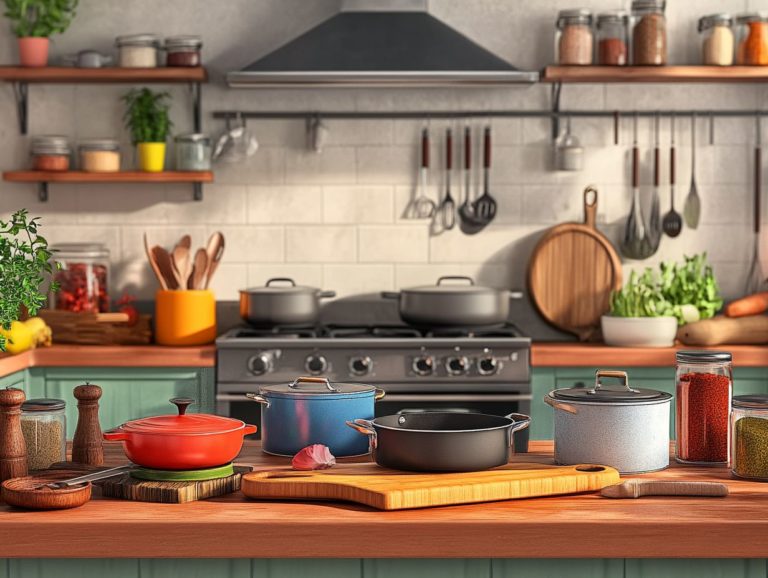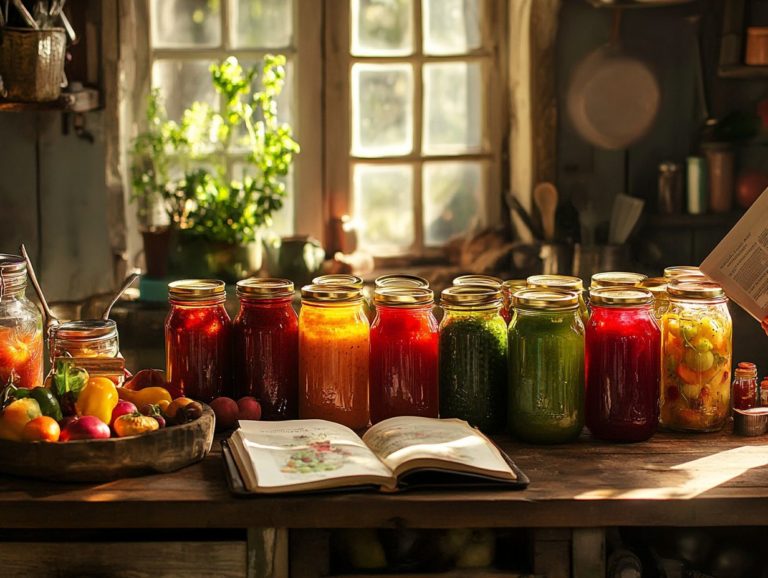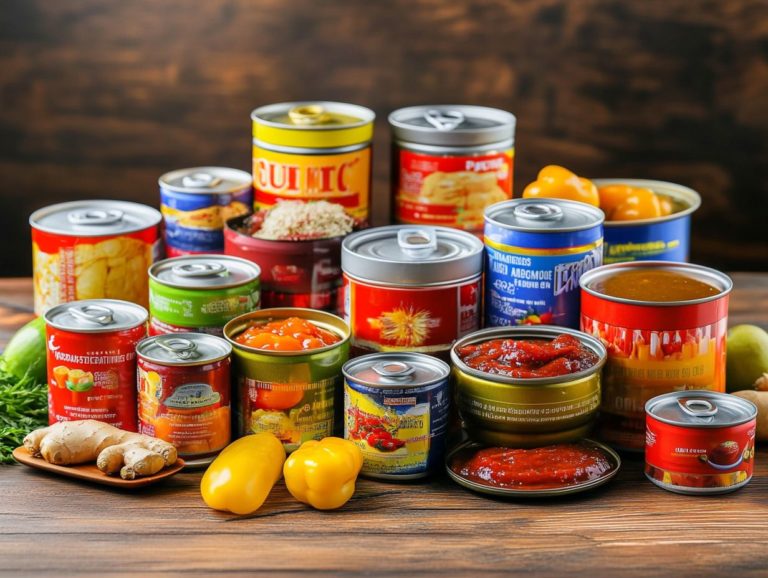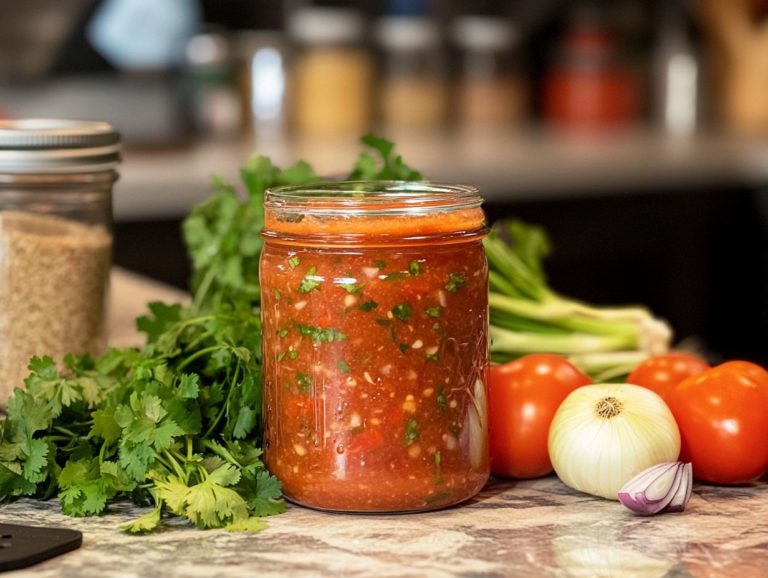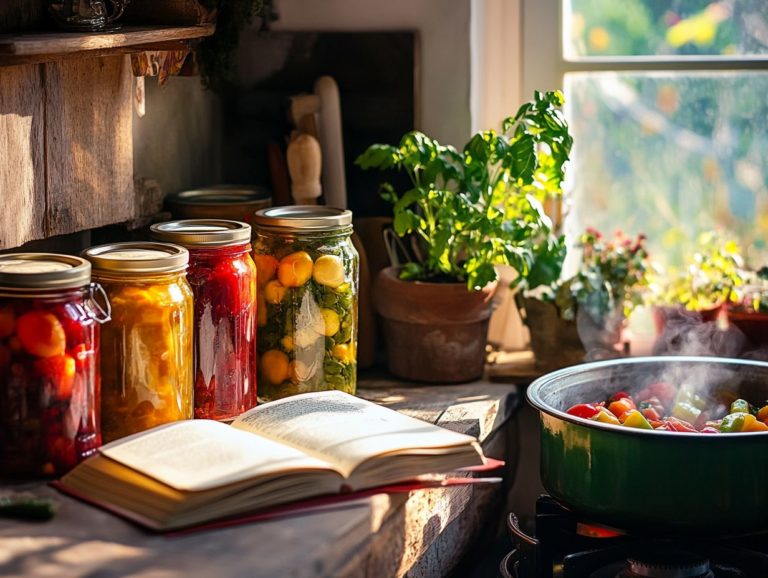Can I Can Sauces and Soups?
Canning sauces and soups is a great way to preserve fresh produce. It also allows you to enjoy the convenience and savings of homemade meals.
Whether you’re keen to extend the life of your garden harvest or whip up quick, flavorful dishes, this guide will illuminate the benefits, types of recipes, and essential steps for safe canning. You ll learn how to utilize both liquid and solid ingredients effectively.
From choosing the finest ingredients to mastering proper storage techniques for both soups and broths, you’ll discover how to create delicious sauces and soups that elevate your culinary repertoire.
Start your canning adventure today! Learn how to thicken soups and preserve vibrant flavors to elevate your kitchen routine!
Contents
Key Takeaways:
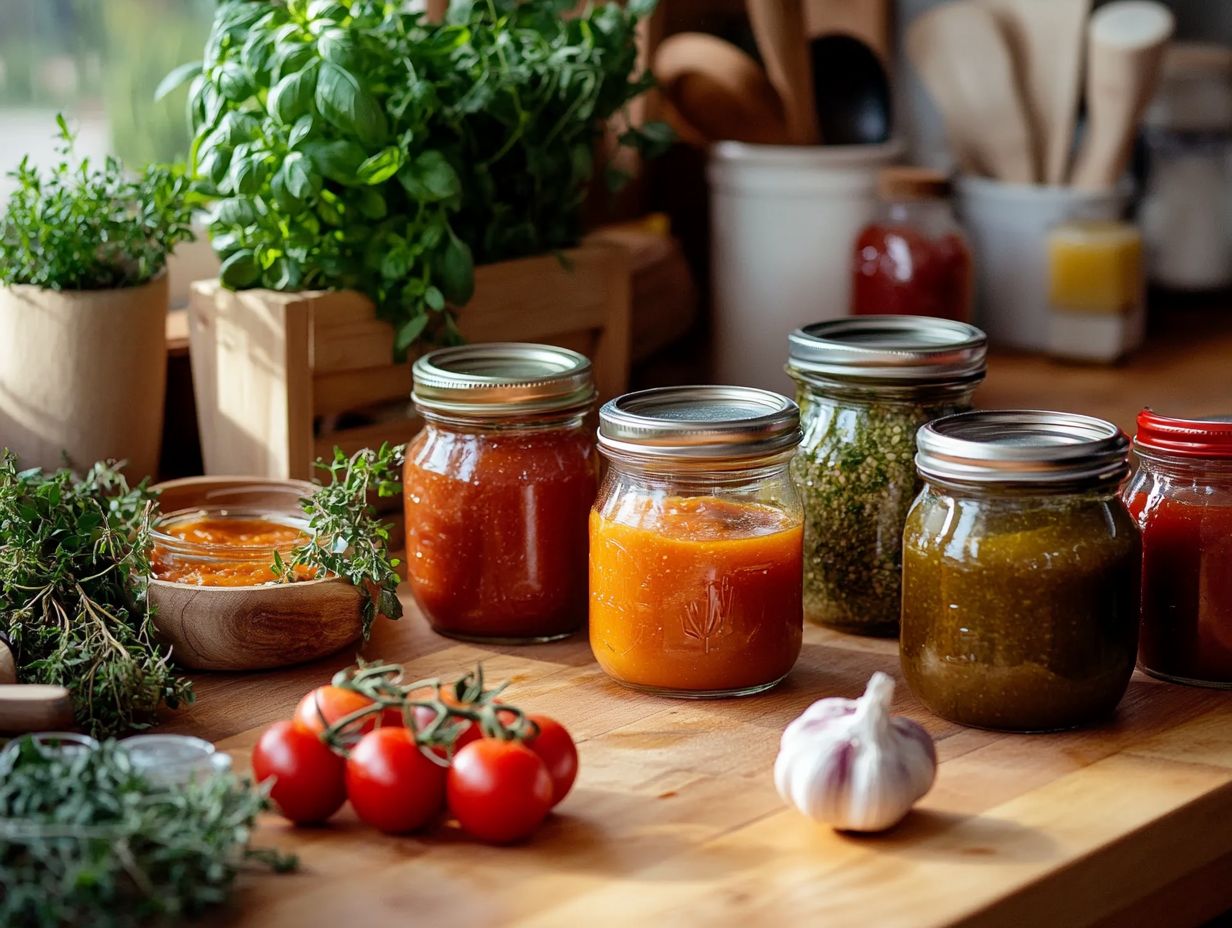
- Canning sauces and soups is an easy and cost-effective way to preserve fresh produce.
- You can safely can various types of sauces and soups with delicious recipes.
- Proper equipment and following a guide are crucial for safe canning.
What is Canning?
Canning is a simple method of preserving food by storing it in jars or cans. This process creates a vacuum seal that ensures the contents remain safe, fresh, and nutrient-rich over time. This time-honored technique, often embraced in home kitchens, allows you to enjoy seasonal produce such as tomatoes, corn, and beans throughout the year while minimizing waste.
By following proper canning processes, you can safeguard against potential issues like botulism, a harmful bacteria that can grow in improperly canned food. This makes canning a reliable choice for those who appreciate the art of homemade meals and the convenience of having preserved ingredients at your fingertips.
Originating in the early 19th century to provide military rations, canning has since evolved into a cherished culinary practice that emphasizes both sustainability and flavor. Today, it remains a relevant technique in modern cooking, encouraging you to utilize fresh ingredients at their peak ripeness, capturing their essence and nutritional value for future enjoyment.
This process not only extends the shelf life of your food but also offers a cost-effective solution for savoring seasonal bounty without the need for preservatives. With the current focus on food safety, mastering canning gives you the power to create safe, wholesome meals that seamlessly align with your lifestyle.
Benefits of Canning Sauces and Soups
Canning sauces and soups brings a wealth of advantages, elevating your meal preparation experience. It extends the shelf life of your creations while giving you the power to control the quality of the ingredients that nourish your family.
By canning your homemade recipes, you re not just preserving rich, vibrant flavors; you re also ensuring that your soups and sauces are devoid of the additives and preservatives often lurking in store-bought options. This delightful practice lets you enjoy your favorite dishes all year long and gives you the power to make healthier choices, significantly enhancing the well-being of your loved ones.
Preserving Fresh Produce
Preserving fresh produce through canning is a smart method to extend the life and flavor of seasonal vegetables while ensuring their safety for consumption. By using techniques like pressure canning, you can prepare delicious homemade vegetable broths, sauces, and soups that capture the essence of your favorite ingredients without sacrificing quality.
This technique cuts down on waste and lets you enjoy vibrant flavors throughout the entire year.
Choosing high-quality, fresh ingredients is crucial, as the flavor and nutrients of the produce will directly influence the final outcome. When considering canning, explore various preservation techniques, such as water bath canning for high-acid foods and vacuum sealing methods to boost longevity.
Safety is paramount. Understanding pH levels and following tested recipes can help reduce the risk of contamination. The right techniques maintain optimal flavor and ensure that the color, texture, and nutritional value remain intact, creating a rewarding home canning experience.
Convenience and Cost Savings
Canning offers both convenience and substantial cost savings, making it an attractive option for families eager to maximize resources while enjoying homemade meals.
This process lets you plan and prepare meals efficiently, freeing up precious time for other important family activities. By incorporating home-canned vegetables and proteins into your weekly menus, you can adopt a budget-friendly approach that keeps last-minute takeout orders at bay.
With thoughtful meal planning, using preserved items will lead to fewer trips to the grocery store, minimizing impulse buys and tightening your budget.
This strategy streamlines meal preparation and encourages healthier eating habits, creating a win-win situation for busy households striving to maintain financial stability.
Types of Sauces and Soups that Can be Canned
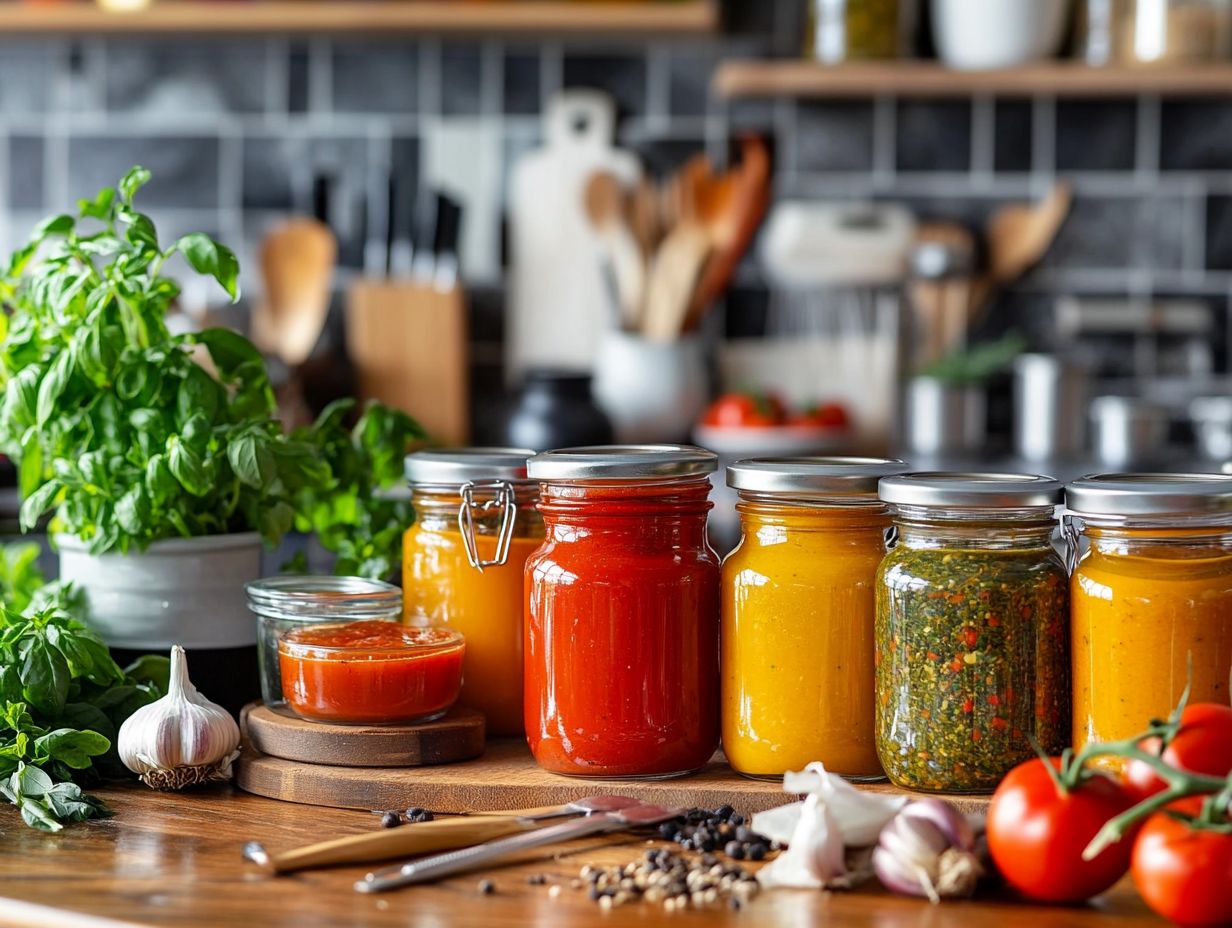
You have an impressive array of sauces and soups at your fingertips that can be canned, offering a delightful variety of flavors and ingredients tailored to your unique tastes and preferences.
- Rich tomato sauces
- Savory vegetable broths
- Hearty bean soups
By venturing into homemade recipes, you can create customized sauces and soups that meet your family’s dietary needs and capture the vibrant essence of seasonal ingredients.
Best Recipes for Canning
In terms of canning, selecting the finest recipes is essential for crafting delicious and safe products that your family will cherish. Popular choices include homemade vegetable broth, flavorful tomato soup, and rich sauces that can enhance a variety of dishes.
By following reliable canning recipes, you ll effectively preserve the vibrant flavors and nutritional benefits of your favorite ingredients, making your meals both convenient and enjoyable.
Focus on food safety by employing proper canning techniques and ensuring that all your equipment is sterilized beforehand. As you prepare these delightful sauces and soups, consider enhancing flavor with herbs like basil or thyme, and always pay close attention to acidity levels, particularly with tomatoes.
Using fresh, seasonal produce not only amplifies taste but also ensures you re preserving high-quality ingredients. With a dash of creativity and meticulous attention to detail, every jar can transform into a culinary gem, ready to elevate any meal while providing you with peace of mind regarding food safety.
Start canning today and enjoy your favorite flavors all year round!
Step-by-Step Guide to Canning Sauces and Soups
A step-by-step guide to canning sauces and soups will empower you to navigate the entire process. You’ll learn everything from preparation to storage, ensuring your homemade creations are safe, bursting with flavor, and ready for future enjoyment.
By gathering the right equipment and supplies think pressure canner (a special pot that cooks food under high pressure to preserve it), jars, and essential utensils you can embark on your canning adventure with confidence.
Recognizing the importance of cleanliness and adhering to precise instructions will help ensure that your preserved foods are safe and delightful for your family s enjoyment.
Equipment and Supplies Needed
To successfully can sauces and soups, you need the right equipment and supplies ready. This sets the stage for a smooth and efficient canning experience.
You ll want to invest in a reliable pressure canner, stock up on canning jars in various sizes, and gather essential utensils like jar lifters and funnels.
A magnetic lid lifter simplifies placing lids on jars. A canning pot with a rack will keep your jars elevated for even heat distribution, preventing direct contact with the bottom.
Adding a timer ensures that each batch is cooked for the right amount of time, which is critical for food safety. Don’t forget accurate measuring tools like measuring cups and spoons; precise ingredient proportions can significantly impact your final product’s flavor and consistency.
By gathering these canning essentials, you maintain quality and ensure the safety of your preserved foods.
Instructions for Safe Canning Process
Following the proper instructions for a safe canning process is essential to ensure that your sauces and soups remain free from contamination and safe for consumption. Key steps include selecting high-quality ingredients and maintaining cleanliness throughout preparation.
Cooking your jars for the right amount of time prevents issues such as botulism. By following these guidelines, you can confidently store your homemade creations for future enjoyment, knowing that you’ve prioritized safety in your canning endeavors.
It’s also crucial to use the right canning method for your recipes, whether water bath or pressure canning, as each method caters to different types of food. After processing, check the seals on your jars and store them in a cool, dark place to prolong their shelf life.
Regularly inspect your stored jars for signs of spoilage. Don t forget to label your jars with the date and contents; this little trick helps you keep track of freshness effectively.
Storing and Using Canned Sauces and Soups
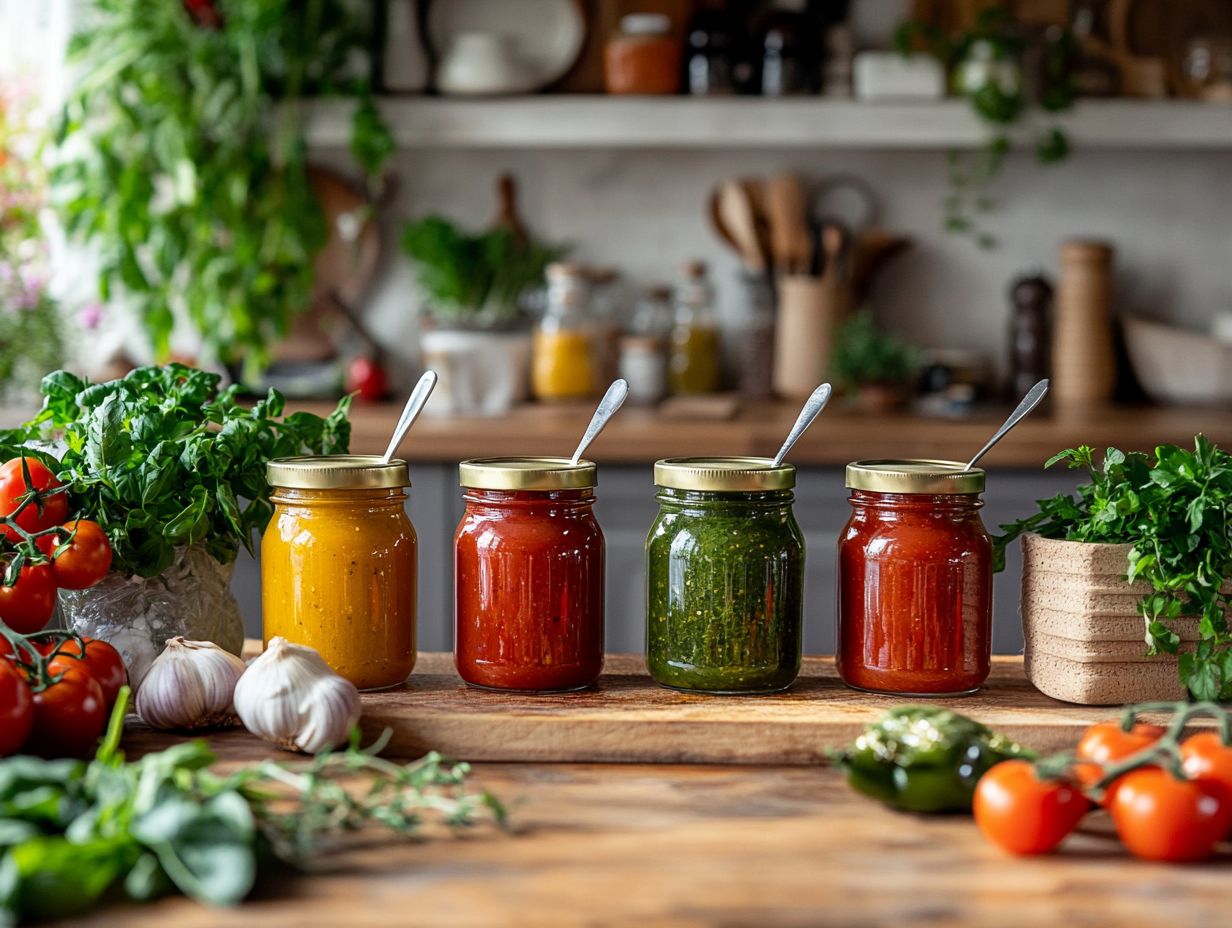
Storing and using canned sauces and soups correctly is essential for maximizing their shelf life and preserving their delightful flavors. This allows you to fully enjoy your homemade creations.
To achieve this, place your jars in a cool, dark place and keep an eye out for any signs of spoilage. By mastering the art of incorporating these canned goods into your meals, you can relish the convenience of quick preparation while savoring the rich flavors of your favorite recipes.
Proper Storage Techniques
Proper storage techniques for your canned sauces and soups are vital for preserving their quality and safety for long-term enjoyment. By keeping your jars in a cool, dark place far from direct sunlight and moisture you help maintain their integrity and extend their shelf life.
Regularly checking for signs of spoilage ensures that your homemade creations remain safe and delicious for family meals. To enhance food safety further, store these canned goods at a temperature below 85 F (29 C), ideally aiming for around 70 F (21 C).
Limiting light exposure, particularly from fluorescent bulbs, will help prevent degradation of the contents. Monitor your jars for any bulging lids, leaks, or unusual odors, as these can be crucial indicators that something is amiss.
Following best practices like using airtight containers if you transfer contents and labeling with dates can significantly contribute to keeping your canned foods safe for consumption over time.
Start your canning adventure now and enjoy the taste of homemade goodness all year round!
Ideas for Incorporating Canned Sauces and Soups into Meals
Canned sauces and soups can improve your cooking while saving time. Picture a rich tomato sauce as the base for pasta or a hearty vegetable broth enhancing stews.
Whip up a creamy mushroom soup for a satisfying chicken casserole. Simmer black bean soup as a zesty topping for baked potatoes.
Need quick meal ideas? Repurpose leftover roasted vegetables with savory canned marinara for a delightful veggie bake. Using these canned goods opens up many meal solutions, ensuring that dinner time remains stress-free and genuinely enjoyable.
Frequently Asked Questions
Can I Can Sauces and Soups?
Absolutely! You can can your own sauces and soups.
What types of sauces and soups can I can?
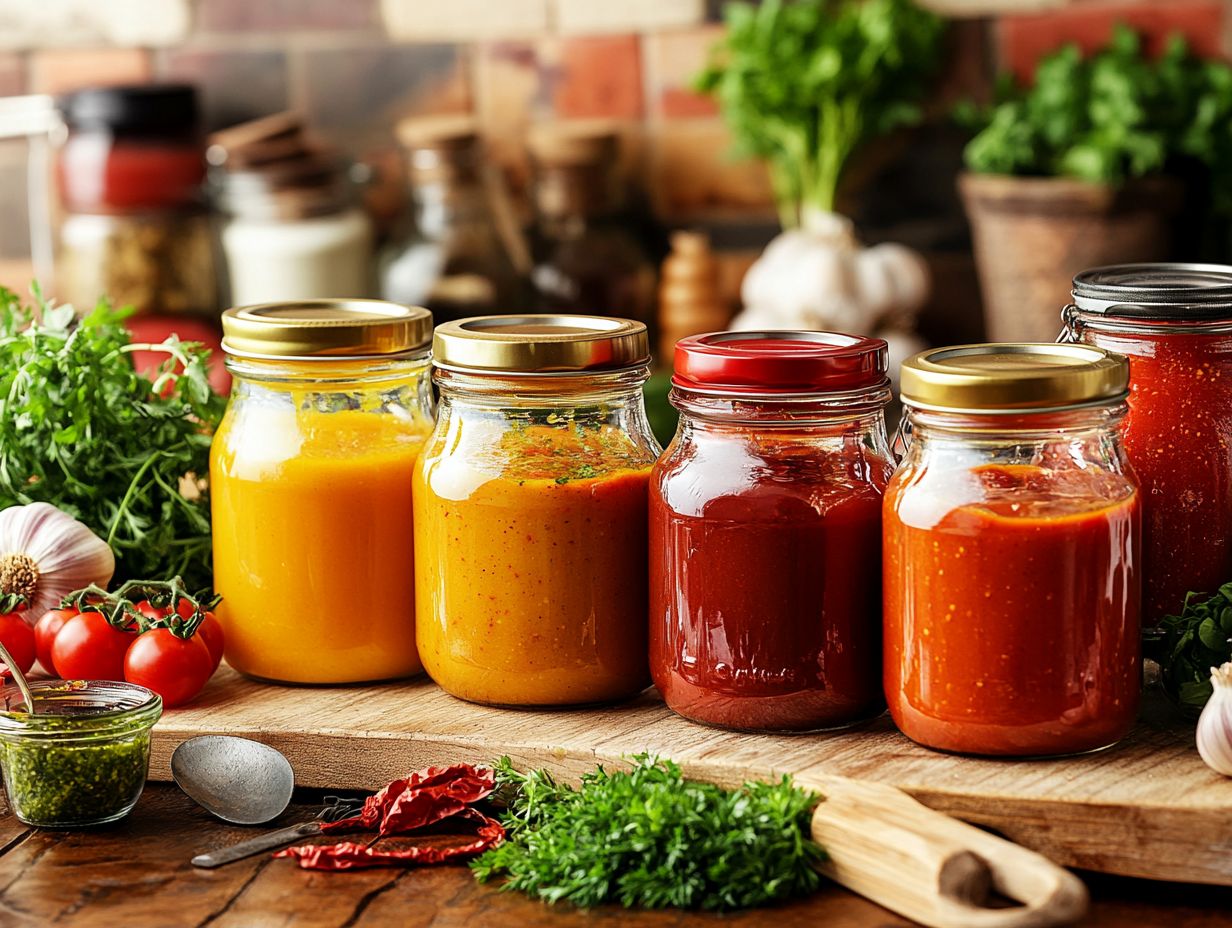
You can can a variety of sauces and soups, like tomato sauce, salsa, or chili. Just follow the proper canning guidelines for each specific recipe.
Do I need any special equipment to can sauces and soups?
Yes, you will need basic canning equipment such as jars, lids, and a canning pot. You may also need a pressure canner for certain recipes. It’s important to use proper equipment to ensure the safety and success of your canned sauces and soups.
How do I know if my canned sauces and soups are safe to eat?
Always use high-quality ingredients and strictly follow canning guidelines. If you notice any signs of spoilage, such as mold or off smells, do not consume the canned sauce or soup.
What is the shelf life of canned sauces and soups?
When stored in a cool, dry place, most canned sauces and soups can last for up to a year. It’s important to label your jars with the date they were canned so you can keep track of their shelf life.
Can I use any type of jar for canning sauces and soups?
No, it’s important to use jars specifically designed for canning. Regular glass jars may break or shatter during canning, making them unsafe for consumption.
